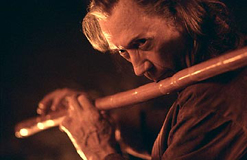Kill Bill: Volume 2 (Quentin Tarantino, 2004)
 In more than just theory,
Kill Bill: Volume 2 is the contemplative and emotionally resonant Jackie
Brown to Volume 1’s glorious, Pulp
Fiction-style delirium. Perhaps less a conflagration of the Shaw Brothers
and De Palma than John Ford and Sergio Leone (yet still possessing Tarantino’s
wicked wit), the movie doesn’t seem as heavily stylized as the first, to these
eyes, probably because its cinematic forbearers come from a place closer to
home. With a directorial style that’s less tightly wound than it had been and
a script that’s far more verbose, this continuation never even flirts with the
notion that it might top the action of Volume
1’s Crazy 88 kung-fu massacre. Though there are still a few impressive
fight scenes here, the weight of the movie rests on its characters. In fact,
there’s so much emphasis on character development here, that the movie never
has the opportunity to set off on a non-narrative bender, in the same way that Vol.
1’s glorious Tokyo arrival scenes did. Now it’s mostly the dialogue,
instead of the musical score, that guides the rhythms of the scenes. Volume
2 is hardly a slave to its story, especially since it so frequently presents
tangential asides, but after the joyous, precision-made flights of fancy that
marked the first part, the shift in tone in Volume
2 requires a mild period of adjustment.
In more than just theory,
Kill Bill: Volume 2 is the contemplative and emotionally resonant Jackie
Brown to Volume 1’s glorious, Pulp
Fiction-style delirium. Perhaps less a conflagration of the Shaw Brothers
and De Palma than John Ford and Sergio Leone (yet still possessing Tarantino’s
wicked wit), the movie doesn’t seem as heavily stylized as the first, to these
eyes, probably because its cinematic forbearers come from a place closer to
home. With a directorial style that’s less tightly wound than it had been and
a script that’s far more verbose, this continuation never even flirts with the
notion that it might top the action of Volume
1’s Crazy 88 kung-fu massacre. Though there are still a few impressive
fight scenes here, the weight of the movie rests on its characters. In fact,
there’s so much emphasis on character development here, that the movie never
has the opportunity to set off on a non-narrative bender, in the same way that Vol.
1’s glorious Tokyo arrival scenes did. Now it’s mostly the dialogue,
instead of the musical score, that guides the rhythms of the scenes. Volume
2 is hardly a slave to its story, especially since it so frequently presents
tangential asides, but after the joyous, precision-made flights of fancy that
marked the first part, the shift in tone in Volume
2 requires a mild period of adjustment.
 Perhaps, that’s why, at least with my
first viewing, the first chapter or two of this installment seemed to drag a
bit, even as they clearly demonstrate Tarantino’s talents. At times, while
watching, I found myself half-wishing that Tarantino had been content simply to
make the best all-out action film, and be done with it, though as the movie
progressed, I warmed up to the soapier aspects of this tale. Tarantino is a
virtuoso storyteller, and it’s difficult to imagine anything that he gives us
being completely without merit. Because of his seemingly short attention span,
and rambling approach to narrative, his movies are varied in tone and constantly
surprising. Even when the plot developments are predictable, which is often,
it’s satisfying to see them play out in fresh ways. Kill Bill, Volume 2 is a love story of sorts, with Uma Thurman’s
Bride coming to terms with her ex-lover Bill (David Carridine). That being said,
the love story that resonates most here is the Sternbergian relationship between
the director and his muse. More than anything, Tarantino’s fixation on his
lead actress gives these movies their emotional hook. Because Quentin’s able
camera is rapt at the very sight of Uma, so are we.
Perhaps, that’s why, at least with my
first viewing, the first chapter or two of this installment seemed to drag a
bit, even as they clearly demonstrate Tarantino’s talents. At times, while
watching, I found myself half-wishing that Tarantino had been content simply to
make the best all-out action film, and be done with it, though as the movie
progressed, I warmed up to the soapier aspects of this tale. Tarantino is a
virtuoso storyteller, and it’s difficult to imagine anything that he gives us
being completely without merit. Because of his seemingly short attention span,
and rambling approach to narrative, his movies are varied in tone and constantly
surprising. Even when the plot developments are predictable, which is often,
it’s satisfying to see them play out in fresh ways. Kill Bill, Volume 2 is a love story of sorts, with Uma Thurman’s
Bride coming to terms with her ex-lover Bill (David Carridine). That being said,
the love story that resonates most here is the Sternbergian relationship between
the director and his muse. More than anything, Tarantino’s fixation on his
lead actress gives these movies their emotional hook. Because Quentin’s able
camera is rapt at the very sight of Uma, so are we.
 As Volume
2 steamrolls toward it’s climactic scenes (hilariously served over white
bread), it becomes obvious that a considerable amount of thematic baggage has
built around this outwardly mindless exercise. A late-breaking, slightly out of
character (Tarantino himself seems to be at the pulpit), monologue about the
Superman mythos explicates about pop culture’s ability to mask greater desires
and fundamental truths about human nature in its attractive promises of
escapism. As a self-reflexive defense against the movie’s detractors, it’s
reasonably effective, but it also carries with it the realization that each of
the DiVAS assassins that the film has concocted has a yearning to break out of
their exaggerated life of crime and assume a relatively normal life. This
yearning makes each of them tragic figures as The Bride offs them on her
rip-roaring rampage of revenge, and acts as a moral in this superficially amoral
tale. It’s noteworthy that Elle Driver, the only character who doesn’t seem
concerned with achieving such normalcy, is the only one who of these killers
that seems “evil” in comic book terms (even though Daryl Hannah’s
intensity makes her feel recognizably human).
As Volume
2 steamrolls toward it’s climactic scenes (hilariously served over white
bread), it becomes obvious that a considerable amount of thematic baggage has
built around this outwardly mindless exercise. A late-breaking, slightly out of
character (Tarantino himself seems to be at the pulpit), monologue about the
Superman mythos explicates about pop culture’s ability to mask greater desires
and fundamental truths about human nature in its attractive promises of
escapism. As a self-reflexive defense against the movie’s detractors, it’s
reasonably effective, but it also carries with it the realization that each of
the DiVAS assassins that the film has concocted has a yearning to break out of
their exaggerated life of crime and assume a relatively normal life. This
yearning makes each of them tragic figures as The Bride offs them on her
rip-roaring rampage of revenge, and acts as a moral in this superficially amoral
tale. It’s noteworthy that Elle Driver, the only character who doesn’t seem
concerned with achieving such normalcy, is the only one who of these killers
that seems “evil” in comic book terms (even though Daryl Hannah’s
intensity makes her feel recognizably human).
 Even more interesting, however, is the
theme of miscegenation that runs throughout both volumes of Kill Bill. The
intermingling of cultures is a constant in Tarantino’s work (it can be seen in
Pulp Fiction’s descriptions
of how Amesterdam’s Burger King chain operates and Jackie Brown’s interracial connection through The Delfonics). In Kill
Bill’s world, we meet a half-Japanese-half-Chinese-half-American Yakuza
leader, a blonde white girl who learns to “play with samurai swords”, a
black woman trying to live a suburban lifestyle, and a white mastermind who
seems to extract equal parts of his wisdom from Eastern and Western sources. In
a movie that calls upon this many other films to construct its pastiche, these
strong characters, suggest that the intermingled sums of who they are, like the
movie they are in, is greater than the individual parts. A snippet of a cartoon
viewed near the end of Volume 2 tells
us blatantly that, “the magpie deserves your respect.” Perhaps that line
best describes the most fruitful way to view the Kill
Bill movies. Quentin Tarantino might be an obsessive collector of forgotten
cinematic possibilities, but he’s also a generous one, reconfiguring them in
an accessible form for modern sensibilities. His movies are one of the greatest
encouragements to cinephilia, because they remind us that there is still value
in those films that have become lore through their obscurity. Now that both
volumes of Tarantino’s epic exist, arguments over whether or not they should
have been split seem utterly pedantic. The massive combination of the first and
second Kill Bill movies stands as a
testament to both Tarantino’s exceptional skill as a filmmaker and the
possibilities of pop cinema.
Even more interesting, however, is the
theme of miscegenation that runs throughout both volumes of Kill Bill. The
intermingling of cultures is a constant in Tarantino’s work (it can be seen in
Pulp Fiction’s descriptions
of how Amesterdam’s Burger King chain operates and Jackie Brown’s interracial connection through The Delfonics). In Kill
Bill’s world, we meet a half-Japanese-half-Chinese-half-American Yakuza
leader, a blonde white girl who learns to “play with samurai swords”, a
black woman trying to live a suburban lifestyle, and a white mastermind who
seems to extract equal parts of his wisdom from Eastern and Western sources. In
a movie that calls upon this many other films to construct its pastiche, these
strong characters, suggest that the intermingled sums of who they are, like the
movie they are in, is greater than the individual parts. A snippet of a cartoon
viewed near the end of Volume 2 tells
us blatantly that, “the magpie deserves your respect.” Perhaps that line
best describes the most fruitful way to view the Kill
Bill movies. Quentin Tarantino might be an obsessive collector of forgotten
cinematic possibilities, but he’s also a generous one, reconfiguring them in
an accessible form for modern sensibilities. His movies are one of the greatest
encouragements to cinephilia, because they remind us that there is still value
in those films that have become lore through their obscurity. Now that both
volumes of Tarantino’s epic exist, arguments over whether or not they should
have been split seem utterly pedantic. The massive combination of the first and
second Kill Bill movies stands as a
testament to both Tarantino’s exceptional skill as a filmmaker and the
possibilities of pop cinema.
83
04-15-04
Jeremy Heilman